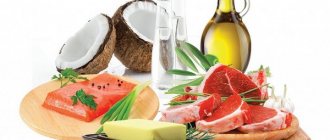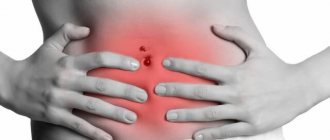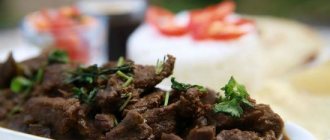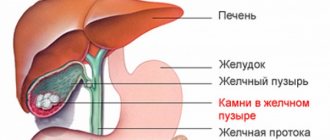Not everyone knows what to do if they have overate and have a stomach ache, but everyone wants to ease their suffering. Overeating is a common problem in the 21st century. All due to the fast pace of life and access to a large amount of food. This phenomenon causes inconvenience.
Loading …
Consult a doctor!
The site provides reference information . Adequate diagnosis and treatment of the disease is possible under the supervision of a conscientious doctor . Any medications have contraindications. Consultation with a specialist and detailed study of the instructions is necessary! Be sure to make an appointment with your doctor .
What to do if you overate and have a stomach ache
After the appearance of unpleasant sensations, you need to stop eating any food.
If you want a small piece of cake, but it doesn’t fit in your stomach, you should refuse. The more full your stomach is, the harder it will be to digest. Accordingly, the symptoms of overeating will be more pronounced. You should avoid drinking too much, although there is a myth that water helps digestion. This is true during normal food consumption, but when overeating, water further expands the volume of the stomach and increases the load on it.
Not all liquids are prohibited, a lot of water is not allowed, but a herbal decoction, a soothing tea on the contrary, is recommended. Warm tea with mint, honey, lemon balm tea is suitable.
If the problem arose within the walls of your own home, you should change clothes. Tight trousers or skirts that squeeze at the waist only increase the pain. For women, a comfortable option is a dress; for men, sports, loose trousers with a loose elastic band.
It is highly undesirable to assume a horizontal position. Lying down after overeating is really dangerous. Due to the overfilling of the stomach, the contents can be thrown back into the esophagus, causing belching and heartburn.
It is recommended to sit and do business in a standing position. Any sudden physical exertion, especially on the abdominal muscles, is not necessary; vomiting can be stimulated.
Half an hour to an hour after overeating, if possible, you should go for a walk, this will improve digestion and gastric motility.
Overeating: from symptoms to stomach relief
Almost everyone loves to eat delicious food. It is especially difficult to resist various delicacies on the holiday table. The New Year holidays are just around the corner, during which our gastrointestinal tract experiences maximum stress. Therefore, today we will talk about what will eliminate or at least reduce the likelihood of unwanted consequences from overeating .
What to take after overeating
If the pain and discomfort are not severe and do not interfere with your usual activities, you can easily get by without medications. Often overeating is not the only problem. It is difficult to overeat if you eat slowly, in small portions.
If you eat quickly, in a hurry, then an unpleasant symptom will definitely appear. Along with food, air is also captured, which increases the volume of the stomach. Medicines for gas formation will help relieve bloating and discomfort. These include Polysorb, Enterosgel, black coal, and simethicone preparations.
Enzymes. Unadapted digestive glands will not be able to synthesize many enzymes; in order to completely digest food, external therapy is needed. Medicines include Creon, Mezim, pancreatin.
Antacids. It is recommended to use when associated with the main symptom of heartburn, throwing food into the esophagus. These include phosphalugel, Almagel.
Prokietics. Excess products need to be quickly removed from the body to relieve discomfort. It is necessary to strengthen the motility of the gastrointestinal tract with the help of Intomed, Motilium, Cerucal.
Antispasmodics. Nerve endings instantly react to overstretched stomach walls, which leads to spasms and pain. To make life easier, you should take meteospasmil, Drotaverine, noshpa.
Heart hurts from overeating
Surely everyone, at least once, has encountered such a problem when, after a heavy feast and overeating, the heart begins to hurt. Heaviness and pressing sensations in the sternum may indicate complications of a cardiac, pulmonary, vascular, psychological or gastrointestinal nature.
Constant overeating causes digestive disorders, which leads to pain in the sternum. Discomfort occurs when you abuse food, which provokes increased gas formation and a feeling of heaviness. Most often these are flour products, sweets and spicy dishes.
There is also such a thing as gastrocardiac syndrome. It is a reflex reaction of the stomach and esophagus to various stimuli. The target is the cardiac part of the stomach, the symptoms of which are very similar to a heart attack or ischemia.
The main symptoms of gastrocardial syndrome:
- Feeling of heaviness in the chest after eating.
- Increasing pain in the heart area, reminiscent of angina pectoris.
- Sense of anxiety.
- Slow heartbeat.
- Increased heart rate after freezing.
- Blood pressure surges.
- Increased sweating.
- Headaches and dizziness.
- Increased weakness.
The appearance of the above symptoms is a reason to seek medical help. Patients are prescribed a set of diagnostic examinations. The diagnosis is confirmed if heart pain appears immediately after eating or drinking a large volume of liquid. Another sign confirming the pathology is that painful symptoms go away on their own without taking medications.
For treatment, complex therapy is recommended, which begins with the normalization of food intake. Patients are prescribed mild sedatives and antispasmodics. It is also mandatory to visit a nutritionist to create a therapeutic diet. If the painful condition is associated with psychological factors, then a course of psychotherapy is indicated.
What does dull, pulling, point or cutting pain in the abdomen indicate?
The presence of pain in any part of the body indicates the progression of the disease. The nature of the pain syndrome is classified into pathological and physiological (the case of pregnancy).
Nagging painful sensations can be a temporary ailment or appear suddenly with such intensity that the patient cannot cope with them (there may be a serious threat to health).
Painful sensations indicate:
- gastrointestinal disorders;
- kidney problems (pain radiates to the lumbar region);
- inflammation of the urinary and reproductive systems.
Any disorder of the gastrointestinal tract is a consequence of ongoing diseases; their carrier often has no idea about the presence of problems in the body.
Reasons why the normal functioning of the gastrointestinal tract is disrupted:
- Peptic ulcer: the intensity of pain varies - from moderately weak to unbearably strong. In case of acute cutting pain, urgent medical intervention is carried out, because probably the release of acidic stomach contents into the abdominal cavity.
- Inflammation of the mucous membrane (gastritis): manifests itself in dull, aching pain, heartburn (often after a person has eaten).
- Pancreatitis: pain begins in the upper abdomen, tormenting for several days, while eating, the discomfort intensifies (bloating is felt, the temperature may rise).
- Inflammation of the gallbladder: pain in the right hypochondrium, often radiating to the arm, chest and neck on the right side.
Diseases reveal themselves by tingling, nausea, vomiting, and fever.
Rare sources:
- Stomach polyps: diagnosis is difficult; the medical history consists of a dull aching pain on palpation, bleeding, nausea, and vomiting.
- Cancer: characterized by a constant, mild aching feeling in the stomach.
- Stress: great physical and emotional stress can cause disturbances in the functioning of the gastrointestinal tract, causing a feeling of pain in it (stool upset and vomiting may occur).
- Allergy: when an allergen enters the body, an aching feeling appears that does not have a clear localization.
If the pain is physiological in nature, i.e. a woman is carrying a child, this is a natural phenomenon: the growing uterus puts pressure on nearby organs, resulting in a feeling of discomfort.
What to do if symptoms are present
If a woman has pain in her lower abdomen for a long time, she should consult a doctor. He will examine the patient, study all the features of the body, and palpate the stomach with his fingers.
If a man comes to the appointment, then usually his testicles and penis are examined, if a woman, then the doctor examines the pelvic area. This allows you to understand whether the lower abdomen hurts due to the uterus, ovaries, and fallopian tubes.
When to see a doctor
You should visit a specialist if the following symptoms appear:
- the duration of pain is more than 6 hours without a break, high intensity;
- in case of sharp pain in the lower abdomen on the right;
- if your stomach hurts after eating;
- if the pain is very strong, appetite disappears;
- when experiencing pain, a person vomits several times in a row;
- if pain in the lower abdomen occurs in pregnant women;
- in case of increased pain when changing body position;
- when the stomach hurts at the navel, then movement occurs. If pain is felt in the lower right quadrant, this may indicate appendicitis;
- if sleep is interrupted due to pain;
- pain ends in bleeding (in pregnant women);
- if in addition to pain there is a high temperature;
- if it is painful for a person to release gases, as well as during bowel movements and urination;
- if there is any kind of pain in the abdomen on the right, which differs from the usual discomfort in the stomach area.
It is best to visit a doctor if your stomach hurts for a week. Then you can avoid serious consequences.
When urgent medical attention is needed
You should call an ambulance as soon as possible in the following situations:
- if your stomach hurts badly and this leads to loss of consciousness and inability to breathe. This is typical for diseases such as liver failure, acute pancreatitis, abdominal bleeding;
- if the stomach hurts badly, a fever appears and the person is unable to move;
- painful sensations in the abdominal area lead to vomiting for several hours or vomiting blood;
- if the intestines do not work for several days due to acute pain. This may indicate obstruction of the digestive tract;
- if bleeding has started from the rectum. If the pain in the lower abdomen is acute, then a person may develop hemorrhagic gastropathy and intestinal ischemia. In the case of a chronic disease, abdominal pain with simultaneous bleeding indicates cancer;
- a person may have pain in the abdomen, chest, but he is not entirely sure of its placement. In such cases, heart disease often occurs;
- Men have stomach pain (groin area). This may indicate testicular torsion. If left untreated, tissue necrosis is possible.
Treatment of abdominal pain
If your stomach hurts, doctors can use two treatment methods - surgery or a conservative method. Sometimes it is necessary to undergo surgery (appendicitis, intestinal obstruction) to save a life. At JSC "Medicine" (clinic of Academician Roitberg), you can undergo effective treatment in a hospital; for this, visit the page.
The most important thing is to visit a specialist on time. He will study the whole picture and prescribe the necessary treatment. If it hurts in the front of the abdomen, tests are taken and all the research is done. Based on this, a diagnosis is already made.
Abdominal pain during pregnancy
If the symptoms listed above are absent, then heaviness in the abdomen and pain may indicate other causes. Pain in the lower abdomen may occur during pregnancy in women who are in the first trimester. This happens as the uterus grows and blood circulation increases. If a woman is pregnant, but the term is later, then abdominal pain may be associated with the fact that the baby’s weight has increased. Such sensations inside the abdomen can also occur as a result of stretching of the pelvic floor muscles, pressure on the rectum and bladder from the side of the uterus.
However, if your stomach hurts with nagging pain, you feel heaviness, but you also have vaginal discharge, spasms, pain, then you should definitely go to a specialist. Such symptoms can prevent premature birth, ectopic pregnancy, and miscarriage.
During pregnancy, your stomach may hurt due to diastasis. The growing uterus puts pressure and causes the abdominal muscles to separate. In most cases there is no pain, but sometimes there is pain in the back and navel. You don't need a doctor's help here. Almost always everything returns to normal after childbirth is over.
Treatment at home
Everything is quite simple here; you can use some methods when there is pain in the lower abdomen:
- eat prunes if you have pain in your lower abdomen. You can also take any product that contains a lot of dietary fiber (broccoli, bran). Prunes are especially useful in such situations because they contain sorbitol (a laxative of natural origin);
- Drink tea made from ginger, chamomile or peppermint. Such herbs reduce nausea and help with abdominal pain. With the help of ginger you can normalize digestion, chamomile and mint will help relieve muscle spasms;
- Use baking soda and prepare an aqueous solution. Baking soda is found in most antacid medications. It is worth taking 1 tbsp. baking soda and dilute with warm water (1 cup);
- Get a massage if your stomach hurts during your period. Spasms may occur inside due to the muscles being too tense. You will need a light massage, you need to focus on the place where it hurts the most;
- take a bath with hot water. Water will relax muscles, improve blood circulation, and relieve pain. You need to lie down for about 20 minutes. If a woman has a stomach ache, you can throw Epsom salts into the bath.
When do you need to see a doctor urgently, and which doctor will help?
Of course, going to the clinic at the first sensation of pain is not necessary. Perhaps a hearty breakfast is poorly absorbed by the body, or the yogurt has expired.
But there are a number of cases when seeing the doctor on time means avoiding negative consequences:
- A strong, piercing pain that appeared for the first time.
- For a long time (up to a week) the feeling of discomfort and heaviness does not go away; if the feeling intensifies, then it is better not to wait a week, but to consult in time.
- Flatulence lasting a couple of days.
- Associated symptoms include frequent urination or a burning sensation that appears during the process.
- Stool disorder is observed for four or more days.
- An elevated temperature is added, which indicates an inflammatory process in the body.
- Pain radiating to the chest, neck, lower back.
If a woman is in an “interesting” position, then any deviation from the norm is a reason for urgent consultation with a specialist.
There are a number of accompanying symptoms that indicate that you cannot do without medical help:
- changes in the patient’s behavior: previously cheerful and full of energy, with the onset of the disease he becomes apathetic and lethargic;
- vomit;
- problems with stool;
- the abdominal wall is in a tense state;
- the pulse is quickened, the person feels hot and cold, and perspiration appears;
- pronounced pallor of the skin.
Doctors of different specializations help with existing problems. A gastroenterologist will help if we are talking about gastrointestinal disorders (usually related to food). If you suspect genitourinary problems, you should seek help from a urologist; women should visit a gynecologist. If discomfort is caused by the groin area, a proctologist will help.
If it is difficult for the patient to self-diagnose the condition (“It just hurts here, but I don’t know what”), it is best to start visiting the clinic with a therapist, who will prescribe the appropriate tests and tell you which specialist to contact. If a child needs help, a pediatrician will consult.
Symptoms of overeating
A feeling of fullness, severe heaviness in the stomach, discomfort, difficulty breathing are the main signs of excessive food consumption.
When you overeat, you often experience abdominal pain. In severe cases, especially when eating unhealthy and refined foods, a person suffers from nausea. This symptom indicates that the body needs to cleanse itself of excess as quickly as possible. Acute spasms are warning signs of vomiting.
Flatulence does not occur in all cases and may be associated with certain foods: coffee, sweets, cabbage, legumes, foods rich in fiber. Gas formation is accompanied by rumbling and severe bloating. After overeating, it is difficult for a person to fall asleep, which is why insomnia occurs.
The stomach hurts because a person has eaten too much food. Not necessarily harmful - fatty, spicy, stuffed with dyes and preservatives. The walls of the stomach are stretched, and this causes discomfort. Due to the difficulties, digestion is disrupted, which causes diarrhea. Less commonly, constipation occurs from overeating.
In some patients, the pain intensifies at night, which is associated with the horizontal position of the person’s body and the peculiarities of the digestion regime during sleep.
The risk of pain increases with excessive production of digestive juice, which happens with ulcers and gastritis.
The cause of pain can be other gastrointestinal diseases, including dysbiosis, pancreatitis, cholecystitis. Incompatible foods provoke discomfort: mushrooms with potatoes, milk and salted fish or other canned foods.
Top medications to reduce abdominal pain, painkillers
The course of treatment is selected by the doctor. But if it is not possible to visit a doctor, and it becomes unbearable to endure, the use of painkillers is allowed.
No-shpa
Dispensing in pharmacies is made without a doctor's prescription. The main active ingredient is drotaverine, which has an antispasmodic effect.
Indications for use: spasms associated with disruption of the gastrointestinal tract, with disorders of the digestive system.
Use with caution in children and pregnant women.
An antispasmodic can significantly reduce blood pressure, therefore, people with hypotension are advised to monitor their condition when taking No-shpa. Taking the drug for more than two days without a doctor's prescription is not recommended.
Metoclopramide
The drug is not available in pharmacies without a doctor's prescription. The main active ingredient is metoclopramide, it stops vomiting, normalizes the gastrointestinal tract, and eliminates pain.
The drug is strictly contraindicated for pregnant women and children. Also not allowed for use by women during lactation.
The use of the drug together with alcohol is unacceptable. It is recommended to stop driving a car for the next 24 hours after taking Metoclopramide.
Maalox
The drug is available in the form of chewable tablets and suspension. Can be purchased at any pharmacy without a prescription. The drug is based on algeldrate and magnesium hydroxide, which have an enveloping effect and cope with pain in the upper abdomen. Actively fights heartburn, a feeling of heaviness and bloating.
Not recommended for use by pregnant and nursing mothers, children under 15 years of age, persons with diabetes mellitus, or kidney disease.
It is permissible to take no more than 12 tablets per day.
Duspatalin
The release form of the drug is tablets. Can be purchased in pharmacies without a prescription. Mebeverine is the main active ingredient, which has an antispasmodic effect, fights colic and heaviness.
Not recommended for women expecting to give birth.
Motilium
Lozenges. Available without a prescription. The drug is based on the substance domperidone, which has a reducing effect on the walls of the stomach. Eliminates nausea, vomiting, and discomfort in the epigastric area. Effective against overeating.
There are contraindications for persons under 10 years of age and pregnant women.
What to do to help yourself?
Unpleasant sensations after overeating will accompany a person for a long period, but as a result they go away on their own. If an unpleasant feeling haunts you, and you don’t want to wait for a return to normal, there are several ways to correct the situation and return to normal well-being.
After overeating, it is possible to get rid of the feeling of heaviness and pain in the stomach with the help of alternative medicine. In order to alleviate the physical condition, herbal infusions and decoctions are used. The following recipes are considered the most effective:
- Herbal infusions. Calamus, lemon balm, St. John's wort, dill seeds, and fennel cope well with the symptoms of overeating. To prepare the infusion you need to take 1 tsp. herbs and 200 ml of boiling water, let stand for 1 minute. Cool the resulting herbal and drink. All herbs can be infused separately, or mixtures can be made by mixing them in equal parts.
- Decoctions. To prepare, take 1 tbsp. l. fruits or leaves of the plant (rose hips, chamomile, blueberries) and 250 ml of water, bring to a boil and boil for about 10 minutes. Cool the broth, strain and drink in small sips.
- Dill water. Both fresh and dried plants are suitable. For 1 teaspoon of crushed plant you will need 150 ml of warm water and 0.5 tsp. Sahara. You can drink water along with greens in small portions.
- Lemon juice. The effect of a few drops of this miraculous remedy will be noticeable within a few minutes.
Return to contents
Medicine offers medications that will help cope with the feeling of discomfort after overeating. The action of the drugs is aimed at breaking down food and improving the functioning of the gastrointestinal tract as a whole. Their mechanism of action is to stimulate the production of food enzymes, which help improve the digestion of heavy foods. After the stomach functions are restored, the symptoms disappear.
PAY ATTENTION! Do not prolong gastritis or an ulcer until stomach cancer, it is better to be on the safe side, but this will be necessary. read the story of Galina Savina >>
The most commonly used drugs are:
To preserve medicinal properties before they enter the stomach, the tablets are coated with a protective layer. Chewing and crushing them is not recommended.
There is no need to give in to the feeling of discomfort and the desire to lie down and relax. Try to go outside, take a walk in the fresh air. Such exercise will return a person to a normal state, and movement will help the body cope with the digestion of food, moving it lower through the gastrointestinal tract. Soon you will feel better and the symptoms of overeating will disappear.
Preventive measures to avoid abdominal pain
There are a number of measures aimed at preventing gastrointestinal diseases:
- avoid evening snacks and overeating before bed;
- Strictly limit or eliminate the consumption of foods high in fat, flour, and sweets;
- coffee is an enemy to health, try to give it up completely;
- food products made with the help of deep processing of meat (sausages, sausages) are one of the possible causes of the development of colon cancer: by refusing to eat them, you will not lose anything; eating natural meat is more beneficial;
- after eating, avoid any stress on the abdominal area for two hours;
- The most banal, but most useful advice of all - do not forget to wash your hands after visiting the toilet and before eating.
Although these recommendations seem primitive, their effectiveness has long been proven. It is not difficult to follow them, and the effect will be obvious.
What causes sudden abdominal pain?
Pain is explained by the body's response to irritants. By its nature one can determine the original source.
cutting
If the abdominal cavity seems to be cut into pieces, most likely the problem lies in the upper parts of the gastrointestinal tract: the stomach, duodenum, pancreas.
The appearance of pain: hydrochloric acid, which is part of the gastric juice, has an aggressive effect on the mucous membrane, which is already damaged.
This is where pain of a burning nature arises. If a person is sick with pancreatitis, then damage to the solar plexus becomes quite possible.
Intestinal colic also reveals itself as a cutting pain. They appear against the background of stress, overwork and other reasons. If a person has acute gastritis, to which food poisoning is added, then such symptoms cannot be avoided.
Stabbing
For various intestinal problems, the most common complaint among patients is stabbing pain in the navel area. Various damaging factors affect the smooth muscles of the intestinal wall, thereby causing its sharp contraction.
Intestinal spasms can simultaneously manifest as stabbing and cutting pain, especially when it comes to food poisoning.
Shingles in the abdominal area
Dull pain surrounding the abdominal cavity has not many causes. It all depends on its location. If it appears on both sides and extends to the top of the navel, then it may be inflammation of the pancreas, or acute pancreatitis. One of the factors in the manifestation and progression of diseases is considered to be excessive consumption of alcoholic beverages.
If the symptom appears on one side along the lower rib, then we can talk about damage to the spinal nerve. The lesion may be a consequence of a previous injury or intervertebral hernia.
Paroxysmal
If a painful feeling manifests itself in attacks according to the “let go-grabbed” principle, then most likely the problem is an intestinal disorder. The process is explained by intestinal peristalsis (complex movements that move a bolus of food).
Pulsating
Perhaps the most dangerous species. It may indicate a purulent process in the abdominal cavity. For example, it could be an abscess that appears as a result of acute appendicitis.
An inflamed pancreas manifests itself with the same symptoms.
DO YOU STILL THINK THAT IT IS HARD TO CURE YOUR STOMACH?
Judging by the fact that you are now reading these lines, victory in the fight against diseases of the gastrointestinal tract is not yet on your side.
Have you already thought about surgery? This is understandable, because the stomach is a very important organ, and its proper functioning is the key to health and well-being. Frequent abdominal pain, heartburn, bloating, belching, nausea, bowel dysfunction. All these symptoms are familiar to you firsthand.
But perhaps it would be more correct to treat not the effect, but the cause? We recommend reading the story of Galina Savina, how she cured her stomach. Read the article >>
Overeating is a condition of the body that can occur suddenly under the right conditions. There are many reasons for poor eating behavior. But they are all united by one practical task - quickly and safely eliminating the consequences of excessive food intake. There are not only pills for this, but also other equally effective methods.
What do various abdominal pains indicate when eating various foods?
According to medical statistics, a third of the world's population experiences discomfort in the abdominal area due to poor nutrition. Therefore, for those who have digestive problems, it is better to avoid some names.
Legumes
Belonging to the legume family, vegetables are rich in minerals and vitamins. But at the same time, the oligosaccharides they contain increase gas formation produced by the digestive system. This is where pain occurs, irritable bowel syndrome.
Soaking legumes overnight will improve their properties. But if this procedure is futile, it is better to switch to whole grains.
Carbonated drinks
If in the case of legume products, complete rejection of them is recommended only under extreme circumstances, then rejection of carbonated drinks is one of the prerequisites for a healthy stomach and intestines.
Any “soda” is characterized by a high level of carbon dioxide, which contributes to bloating and the appearance of pain. That is, with every sip of a carbonated drink a person consciously adds gases to the body, which is where the spasms begin.
Since “soda” does not have the slightest nutritional value, you can safely replace it with freshly squeezed juices and fresh juices.
Wheat
According to studies, gluten contained in wheat can contribute to digestive system disorders. But the usual diet of many people largely consists of this cereal.
If you are hypersensitive to gluten, it is recommended to completely avoid this crop, as well as similar ones that also contain gluten: rye, barley, oats, etc.
Eating products containing wheat grains can lead to pain, diarrhea, flatulence, and bloating.
Onion
Most people, even with their mother’s milk, learn the rule that onions are healthy, the more you eat, the better, you will get sick less.
But, if a person has problems with the gastrointestinal tract, then the sulfur compounds and fructans that make up raw onions will cause flatulence, bloating and pain. To avoid this, it is recommended to replace onions with other spicy herbs that do not have a similar effect.
Dairy
Due to the high level of lactose, contrary to the general opinion about their usefulness, they cause irreparable harm to health. Butter, cheeses, milk, and yogurt contain milk sugar, which causes discomfort in the stomach.
People who are lactose intolerant suffer from bloating, intestinal cramps, diarrhea and increased gas formation after consuming milk-containing products.
An excellent alternative to cow's milk is soy, rice, coconut or almond milk. They are also rich in beneficial microelements, but do not cause problems with the gastrointestinal tract.
Apples
“An apple a day and you don’t have to go to the doctor,” says a well-known proverb. But the high fructose and fiber content makes the apple a source of bloating, excess gas accumulation in the intestines and digestive problems.
If it is not possible to completely give up apples, you should try cooking them - this will reduce the pain of side effects.
Garlic
The fructans and sulfur contained in garlic cloves contribute to the appearance of bloating, cramps, and stomach pain. Garlic is also considered a powerful allergen. People with garlic intolerance experience painful flatulence and unpleasant belching after eating it.
Heat treatment of garlic usually helps to avoid unpleasant consequences after eating.
Don't rush to completely give up your favorite foods. Try reducing the amount of them in your diet and subjecting them to various treatments, which will reduce the likelihood of side effects.
Overeating and feeling nauseous? How to deal with the consequences of overeating
Eating disorders, various gastrointestinal disorders, excess weight, it would seem that the cause of these clinical signs is a serious illness. But in most cases, this is not entirely true.
Colic, flatulence, heaviness, nausea are some of the first symptoms of overeating. Today, this phenomenon is extremely common among both adults and children.
This is due to the fact that most people cannot control and adhere to a balanced diet.
However, it is important to note that it is overeating that provokes the development of obesity, which means it worsens health and contributes to the development of serious pathologies.
In order to avoid such situations, you need to know what overeating is, what symptoms can be used to detect such a condition and, of course, what to do if you overeat and feel sick?
Why does a person overeat
To answer the question of what to do when overeating, it is worth finding out the main reasons for this phenomenon. These include:
• Having fun. In many developed countries, the population suffers from obesity, as consumers often have a desire to try something new. This is done to irritate the pleasure center.
In such cases, ordinary healthy foods are replaced with more harmful ones, enriched with various additives, flavors and preservatives.
In addition, some manufacturers add substances to their products that enhance the taste and irritate the taste buds.
• Stressful situations. Many people, during periods of depression or when nervous stress increases, begin to eat large amounts of food. The result is severe overeating. What to do in such cases? We'll talk about this a little later.
• Eating large amounts of food due to boredom. Many people need this to create a busy effect. However, this is not an option.
Psychological reasons
This may include an irresistible urge to swallow something when experiencing unpleasant events. This applies to a greater extent to people with an unstable nervous system. I ate and my mood improved, which is facilitated by the production of serotonin in the brain - the hormone of pleasure.
This way of “eating” stressful conditions becomes a habit, forcing you to reach out for sweets whenever your mood changes towards anxiety. Low self-esteem and dissatisfaction with your life force you to look for something that can brighten up your life and lift your spirits.
Often the solution is food. Having once noticed relief after eating a meal, a person returns to the life-saving remedy again.
However, each time, in order to obtain satisfaction, you have to absorb more and more products, until, finally, each sitting at the table ends in satiation, as they say, to satiety.
Neuroses carried over from a difficult childhood full of grievances into adulthood contribute to rapid adaptation to abundant nutrition. This is also caused by the habit, acquired thanks to adults, of eating everything without a trace, despite the capricious “no longer fits”, rewarding sweets for obedience and good grades, simply feeding them tasty things.
This is a disordered eating pattern where you have to eat food at different intervals. During long breaks, constant snacking. High-calorie buns and hamburgers, depleted of vitamins and mineral salts, will not fill you for a long time, so you have to refresh yourself again.
In addition, it happens that the feeling of hunger masks a banal lack of fluid in the body, but instead of a couple of glasses of water, we start chewing. It should be said here that it is useless to eliminate this deficiency with soda, tea, coffee, only clean water is needed.
Overeating always follows fast food, when the signal of satiety does not keep pace with feverish eating. For the same reason, old people suffer from overeating - here the central nervous system is delayed with the signal due to age-related changes.
The tendency to overeat is inherent in the lack of vitamins and microelements in food, the absence of which leads to a failure of physiological processes.
There is no point in fighting overeating if you don’t know the reasons why you want to put more and more food on your plate. So, among the main ones, psychologists and nutritionists identify the following:
- Psychological dependence on food, when favorite dishes become the only or main means of obtaining pleasure. In this case, the glutton likes to eat alone and sits over the plate for a long time.
- Hormonal disorders, lack of vitamins.
- Increased appetite at a festive table or in a hotel restaurant on an all inclusive basis, when you have access to an unlimited amount of food and it’s difficult to restrain yourself from trying all the dishes.
- Eating problems and bad mood. Dislike for oneself and increased self-criticism leads to the fact that a person eats a lot just because food makes him happy, and he forgets about his experiences.
Knowing the cause of overeating and analyzing it, it is easier to find a way to get rid of the bad habit. A psychologist can help someone, but someone - if overeating is accompanied by any health problems - should contact an endocrinologist.
Main features
So, what to do when you overeat and how to determine that the body has become oversaturated? There are several signs that indicate your stomach is full.
If a person overeats once, then no special symptoms will arise. In this case, you may feel heaviness in the stomach, accompanied by bloating. If overeating occurs regularly, then its symptoms will be more pronounced. In this case, a person can independently feel changes in the body:
• Significant weight gain and changes in usual lifestyle.
• Insomnia.
• Discomfort in the intestinal area caused by gases and flatulence.
• Uncontrolled eating. A person will consume foods even in cases where the body does not need it: when watching a movie, sitting at the computer, and so on.
Women often complain of overeating during pregnancy. What to do and how to avoid this? It is worth considering that during pregnancy, internal organs are compressed. This also applies to the stomach. Expectant mothers should eat food in small portions, increasing the number of meals to 6 per day.
How to remove unpleasant symptoms
The consequences of a large meal go away on their own if you wait a little. You can apply a warm heating pad to your stomach. Heat relieves spasms and increases blood flow to the digestive organs. The process will go faster and more comfortably.
Heaviness in the stomach
Doctors recommend taking enzyme preparations when overeating: Festal, Creon, Pancreatin or Mezim. They will help digest a large amount of food if a person lacks his own enzymes. Such medications are sold without a prescription, but they must be taken strictly according to the instructions.
- Pain in the lower abdomen in men: diseases of the genitourinary system
- Vitamin B in ampoules
- Grooves on the tongue
Nausea
You can drink some water with lemon juice; the sour drink will remove the unpleasant feeling in the stomach. Mint chewing gum is useful. If these methods do not work, prokinetic medications will help. The drugs Domperon and Motilium stimulate the motility of the stomach and duodenum, helping food move further. And Gastrosil, Cerucal and Reglan, in addition, reduce the excitability of the vomiting center.










